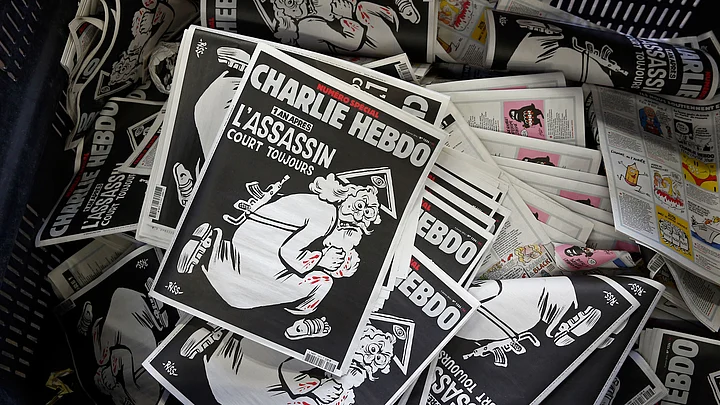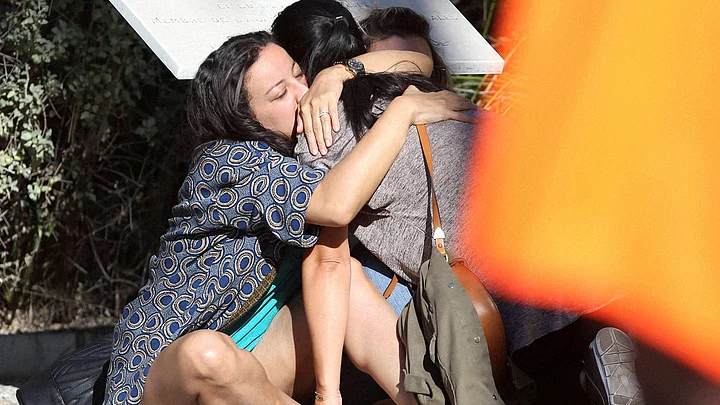Two people have been stabbed in Paris, on the same road where the satirical magazine Charlie Hebdo’s offices once used to be, and which is now the office of Premieres Lignes, a news production agency.
A man and a woman, both employees of the production agency, were reported as smoking a cigarette outside the main door – almost under the memorial placard (a mural) for the victims of the 2015 Charlie Hebdo carnage – when a young man attacked them with a meat cleaver.
The reason being his outrage against the magazine’s recent republication of controversial cartoons featuring the Prophet Muhammad.
Since the 2015 attack, Charlie Hebdo has moved its offices to a secret location, but the attacker still believed, as per reports, that the magazine’s offices continued to be at the original location.
The stabber, caught by the French Police soon after the attack on Friday, 25 September, with blood-stained clothes, is an 18-year-old man named Ali Hassan, reportedly of Pakistani-origin.
His name could also be Hassan Ali, but it is not clear, because the youth, who arrived in France three years ago – and claims to have been born in Islamabad and to be a minor (at the time of arrival) – usually switches between these two names.
Outrage In Pakistan Over Republishing Of Charlie Hebdo’s ‘Prophet Muhammad Cartoons’
Given recent trends, it might very well emerge that Ali had arrived in France and was seeking asylum on the pretext of having escaped from the clutches of the Taliban or a jihadi group – this is an all-too-familiar story – and it usually works. Migrants in Europe, especially Pakistanis, are instructed by families or their traffickers, to say so. And, declaring to yourself as a minor grants you the immediate benefit of humanitarian protection.
During these three years, Ali had been hauled up a couple of times by police for petty crimes. Also, it is not by chance that this particular stabber is allegedly of Pakistani origin, nor is it a matter of chance that this incident has happened now. After him, another group of Pakistanis or Pakistani-origin people were arrested.
At the beginning of September 2020, in fact, the trial against some of the killers in the 2015 Charlie Hebdo carnage had begun in Paris.
And the magazine, in solidarity and in memory of the victims, took a bold decision and decided to republish the ‘incriminating’ cartoons of Prophet Muhammad.
Soon after, all hell broke loose in Pakistan.
There have been demonstrations in every big city in Pakistan, from the capital Islamabad, to the cultured and intellectual city of Lahore. As per a report, people from other countries too, such as Indonesia, Yemen, Nigeria, Iran, Chechnya and even France, have held protests against Charlie Hebdo’s recent move.
Hundreds of goons carrying placards saying ‘Decapitation is the punishment for blasphemers’, ‘Death to France’ have been flooding the streets.
The crowds were also shouting other slogans like ‘Stop barking, French dogs’, and other assorted death threats. French flags were burnt in the streets, and the ‘peaceful protesters’ kept asking the government to expel the French ambassador in Pakistan, and to cut off diplomatic ties with the country.
- A man and a woman, both employees of the production agency, were reported as smoking a cigarette outside the main door – almost under the memorial placard (a mural) for the victims of the 2015 Charlie Hebdo carnage – when a young man attacked them with a meat cleaver on 25 September.
- At the beginning of September 2020, the trial against some of the killers in the 2015 Charlie Hebdo carnage had begun in Paris.
- The satirical magazine, in memory of the 2015 victims, decided to republish the ‘incriminating’ cartoons of Prophet Muhammad.
- Soon after, all hell broke loose in Pakistan. Hundreds of goons carrying placards saying ‘Decapitation is the punishment for blasphemers’, ‘Death to France’ have been flooding the streets.
- Curiously enough, the Pakistani State has never condemned the killings of Shias and Ahmadiyyas on its own soil, or complained against the discriminatory racial and religious-labelling and persecution of so-called ‘kafirs’ and ‘goras’.
Pakistan’s ‘Double-Standards’ On Human Rights
The demonstrations, a true expression of the ‘freedom of speech’ Pakistan enjoys, were held by a truly ‘democratic and civilised’ party: the Tehreek-e-Labbaik Pakistan. To be clear, members of the same party had showered rose petals on liberal politician Salman Taseer's assassin in 2011, and paralysed the country when Asia Bibi was found innocent and released.
The Pakistani government, far from trying to stop the vandalising of a national flag and the death threats against another (‘friendly’) country, of course supported the goons on their own soil.
Pakistani Foreign Minister Shah Mahmood Qureshi went on Radio Pakistan to condemn France and the French for publishing a cartoon in a magazine in their own country. Adding that: “No amount of condemnation is enough” – and then ‘singing’ the latest ‘song’ in its already worn-out playlist: “We are seeing a rise in islamophobia, racism and Xenophobia across the world, and Pakistan has highlighted this in all forums”.
The Foreign Ministry of Pakistan also tweeted that, such a ‘deliberate act’ to “offend the sentiments of billions of Muslims cannot be justified as an exercise in press freedom or freedom of expression”.
Curiously enough, nobody has ever heard a word of condemnation against the killings of Shias and Ahmadiyyas on Pakistani soil, or a complain against the discriminatory racial and religious-labelling and persecution of so-called ‘kafirs’ and ‘goras’.
Pakistan’s Very Own ‘Let Them Eat Cake’ Moment
But it probably works only one way. Ali Hassan (or Hassan Ali) took the words of the Pakistani foreign minister literally, and went to what he thought was still Charlie Hebdo's office, because, in his words, “he could not bear” the cartoons – cartoons that, by the way, he had never seen, only heard about.
Inciting hatred and violence, or allowing hatred and violence, gives poisoned fruit. Qureshi, Imran Khan and their ‘puppeteers’ have ‘blood on their hands’ – of two innocent French citizens, and that of their own citizens.
Ultimately, allowing flags to be burned in the streets and wishing death to people in other countries is a good way to put smoke in the eyes of others, and prevent them from criticising tragedies and the lack of freedom in their own country.
This, at the end of the day, is the Pakistani version of ‘Marie Antoinette’s brioches’ – ironically, a Queen of France.
General Bajwa, Prime Minister Imran Khan and their government should read a couple of books to learn about what happens to rulers when people get fed up of brioches / cakes.
(Francesca Marino is a journalist and a South Asia expert who has written ‘Apocalypse Pakistan’ with B Natale. She tweets at @francescam63. This is an opinion piece, and the views expressed above are the author’s own. The Quintneither endorses nor is responsible for them.)
(At The Quint, we question everything. Play an active role in shaping our journalism by becoming a member today.)



